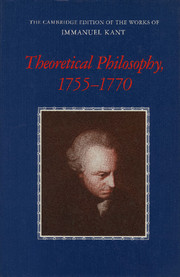Book contents
- Frontmatter
- Contents
- General editors' preface
- Preface
- Guide to abbreviations
- General introduction
- Introductions to the translations
- Résumés of the works
- A NEW ELUCIDATION OF THE FIRST PRINCIPLES OF METAPHYSICAL COGNITION (1755)
- THE EMPLOYMENT IN NATURAL PHILOSOPHY OF METAPHYSICS COMBINED WITH GEOMETRY, OF WHICH SAMPLE I CONTAINS THE PHYSICAL MONADOLOGY (1756)
- AN ATTEMPT AT SOME REFLECTIONS ON OPTIMISM (1759)
- THE FALSE SUBTLETY OF THE FOUR SYLLOGISTIC FIGURES (1762)
- THE ONLY POSSIBLE ARGUMENT IN SUPPORT OF A DEMONSTRATION OF THE EXISTENCE OF GOD (1763)
- ATTEMPT TO INTRODUCE THE CONCEPT OF NEGATIVE MAGNITUDES INTO PHILOSOPHY (1763)
- Preface
- Section 1 Elucidation of the concept of negative magnitudes in general
- Section 2 In which philosophical examples embodying the concept of negative magnitudes are adduced
- Section 3 Containing some reflections which may serve to prepare the application of the above concept to the objects of philosophy
- INQUIRY CONCERNING THE DISTINCTNESS OF THE PRINCIPLES OF NATURAL THEOLOGY AND MORALITY (1764)
- M. IMMANUEL KANT'S ANNOUNCEMENT OF THE PROGRAMME OF HIS LECTURES FOR THE WINTER SEMESTER 1765 — 1766 (1765)
- DREAMS OF A SPIRIT-SEER ELUCIDATED BY DREAMS OF METAPHYSICS (1766)
- CONCERNING THE ULTIMATE GROUND OF THE DIFFERENTIATION OF DIRECTIONS IN SPACE (1768)
- ON THE FORM AND PRINCIPLES OF THE SENSIBLE AND THE INTELLIGIBLE WORLD [INAUGURAL DISSERTATION] (1770)
- Factual notes
- Bibliographies of editions and translations
- Glossary
- Biographical-bibliographical sketches of persons mentioned by Kant
- Index
Preface
Published online by Cambridge University Press: 18 December 2014
- Frontmatter
- Contents
- General editors' preface
- Preface
- Guide to abbreviations
- General introduction
- Introductions to the translations
- Résumés of the works
- A NEW ELUCIDATION OF THE FIRST PRINCIPLES OF METAPHYSICAL COGNITION (1755)
- THE EMPLOYMENT IN NATURAL PHILOSOPHY OF METAPHYSICS COMBINED WITH GEOMETRY, OF WHICH SAMPLE I CONTAINS THE PHYSICAL MONADOLOGY (1756)
- AN ATTEMPT AT SOME REFLECTIONS ON OPTIMISM (1759)
- THE FALSE SUBTLETY OF THE FOUR SYLLOGISTIC FIGURES (1762)
- THE ONLY POSSIBLE ARGUMENT IN SUPPORT OF A DEMONSTRATION OF THE EXISTENCE OF GOD (1763)
- ATTEMPT TO INTRODUCE THE CONCEPT OF NEGATIVE MAGNITUDES INTO PHILOSOPHY (1763)
- Preface
- Section 1 Elucidation of the concept of negative magnitudes in general
- Section 2 In which philosophical examples embodying the concept of negative magnitudes are adduced
- Section 3 Containing some reflections which may serve to prepare the application of the above concept to the objects of philosophy
- INQUIRY CONCERNING THE DISTINCTNESS OF THE PRINCIPLES OF NATURAL THEOLOGY AND MORALITY (1764)
- M. IMMANUEL KANT'S ANNOUNCEMENT OF THE PROGRAMME OF HIS LECTURES FOR THE WINTER SEMESTER 1765 — 1766 (1765)
- DREAMS OF A SPIRIT-SEER ELUCIDATED BY DREAMS OF METAPHYSICS (1766)
- CONCERNING THE ULTIMATE GROUND OF THE DIFFERENTIATION OF DIRECTIONS IN SPACE (1768)
- ON THE FORM AND PRINCIPLES OF THE SENSIBLE AND THE INTELLIGIBLE WORLD [INAUGURAL DISSERTATION] (1770)
- Factual notes
- Bibliographies of editions and translations
- Glossary
- Biographical-bibliographical sketches of persons mentioned by Kant
- Index
Summary
The use to which mathematics can be put in philosophy consists either in the imitation of its method or in the genuine application of its propositions to the objects of philosophy. With respect to the first of these two uses: it has not been noticed that it has had only one benefit, in spite of the great advantage expected of it to start with. Furthermore, the high-sounding titles, with which philosophers, jealous of geometry, were induced to decorate the propositions of philosophy, have now been gradually abandoned. The impropriety of provocative gestures made in lowly circumstances, and the stubborn refusal of the importunate non liquet to yield to all this pomp, have come to be modestly recognised.
By contrast, the second use to which mathematics has been put in philosophy has been all the more beneficial to the parts of philosophy affected. These parts of philosophy, by turning the doctrines of mathematics to their own advantage, have attained to heights, to which they would not otherwise have been able to aspire. But the parts of philosophy to which I am referring are only the insights of physics – unless, that is, one is obliged to include in philosophy the logic of probability. As for metaphysics, this science, instead of turning certain of the concepts or doctrines of mathematics to its own advantage, has, on the contrary, frequently armed itself against them. And where it might, perhaps, have been able to gain secure foundations on which to base its reflections, it is to be seen trying to turn mathematical concepts into subtle fictions, which have little truth to them outside the field of mathematics. It is not difficult to guess which side will have the advantage if two sciences enter into a dispute with each other, where the one excels all others in certainty and distinctness, while the other has only just started out on the path to these objectives.
- Type
- Chapter
- Information
- Theoretical Philosophy, 1755–1770 , pp. 207 - 210Publisher: Cambridge University PressPrint publication year: 1992
- 1
- Cited by



